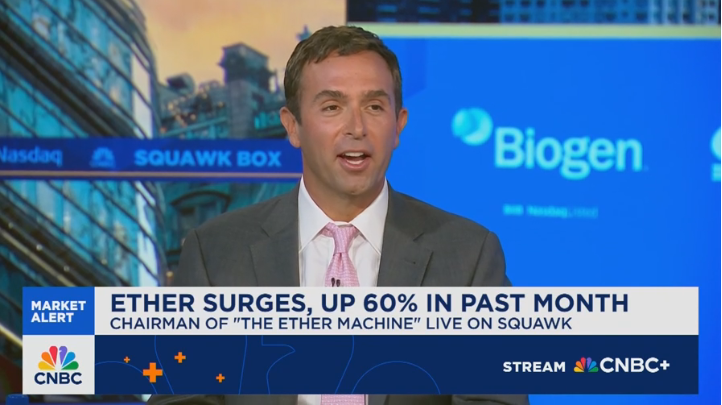According to Andrew Keys, co‑founder and chairman of the Ether Machine, Bitcoin feels like yesterday’s tool.
He told CNBC’s Squawk show on July 21 that he’d “rather have an iPhone than a landline.”
Keys went on to say he owns zero Bitcoin, staking his entire belief on Ethereum. That move puts him in a small group of crypto backers who champion Ethereum without holding any Bitcoin.
Ethereum Firm Backs GENIUS Act
Based on reports, Keys says the GENIUS Act will be a game‑plan for growth. That law, approved on July 18, clears the way for US‑based stablecoin issuers by setting guardrails for audits, reserves and licensing.
More than 50% of all stablecoins now run on Ethereum’s smart‑contract network. If stablecoin volumes hit the predicted trillions, that share would drive big fee gains for validators and dApps alike.

Smart‑Contract Network Attracts Institutional Flows
According to Keys, institutional players will flock to Ethereum for settlements and real‑world tokenization. He compared Ethereum’s stablecoin grip to Google’s search dominance, noting Google has about 90% of all searches.
Banks and funds, he said, will find it easier to handle cash‑like tokens on a network built for programmable money. That view echoes strategist Tom Lee of FundStrat, who recently said Ether could jump to $15,000 by year‑end. Lee, however, still holds Bitcoin as well as Ethereum.
SPAC Listing Raises Big Money
Based on filings, the Ether Machine has teamed up with SPAC firm Dynamix Corporation to list under the ticker ETHM on Nasdaq.
Keys is putting in $645 million of his own funds as an anchor investment. The combined company aims to raise $1.5 billion to back a treasury of ETH, staking operations and DeFi strategies. Investors like 10T Holdings, Pantera Capital and Electric Capital have already signed on.
Competition From Layer‑2s And Other Chains
According to on‑chain data, some activity is shifting to Layer‑2 networks such as Arbitrum and Optimism. Rival blockchains like Solana and Avalanche also host parts of the stablecoin market and NFT trades. That trend could spread transaction fees away from Ethereum mainnet, curbing some of its expected gains.
Based on market chatter, some analysts worry about a cliff in SPAC deal flow. Closing the ETHM merger depends on shareholder redemptions and SEC review.
There’s also regulatory risk over staking services, which the SEC may see as unregistered securities. Gas‑fee spikes during periods of heavy use could deter new users, too.
Featured image from Unsplash, chart from TradingView

Editorial Process for bitcoinist is centered on delivering thoroughly researched, accurate, and unbiased content. We uphold strict sourcing standards, and each page undergoes diligent review by our team of top technology experts and seasoned editors. This process ensures the integrity, relevance, and value of our content for our readers.













